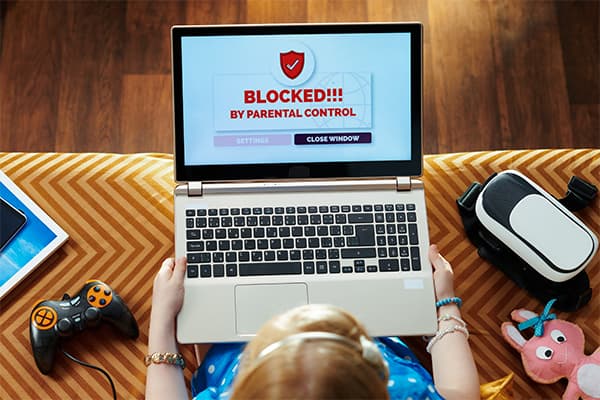Social Media – How It Affects The Self Image Of Your Child?
Aditi Patel
Top 10 Best Parental Control Apps Editor
Research indicates that excessive use of social media can have detrimental effects on the self-esteem of adolescents and preteens.

As children transition into their teenage years, they often seek independence and acceptance. Many turn to social media platforms to fulfill these needs, as they offer a space for communication and allow users to curate their online image. Positive feedback received on social media triggers the release of dopamine in the brain, leading to a desire for more validation. While this may temporarily boost self-confidence, it creates a cycle of seeking approval through social media interactions, which can impact overall self-esteem.
However, social media also has its downsides. Research indicates that excessive use of social media is associated with negative effects on mental health, including decreased self-esteem and life satisfaction. The more time individuals spend on social media, the more pronounced these effects tend to be. Adolescents may not fully grasp the consequences of their online interactions, and the prevalence of cyberbullying and negativity on social media platforms can exacerbate these issues. Harmful comments and experiences online can have lasting effects on the self-esteem and mental well-being of young individuals.
Engaging excessively with social media, whether by consuming content, posting, or interacting, can significantly impact a young person’s self-esteem. To address this issue, it’s crucial to first recognize the risks involved before moving on to potential solutions. Let’s begin by exploring these risks.
More time spent browsing social media, worse the effect
When children and adolescents dedicate excessive time to social networking platforms, they tend to either focus on the curated images projected by others or meticulously craft their own online personas seeking validation. This binary approach leaves little room for a balanced perspective. While occasional engagement with either aspect is acceptable, prolonged immersion in either can have detrimental effects.
- Mental Health: Studies conducted by the Royal Society for Public Health in the U.K. revealed that children who spent two or more hours daily on social media faced an elevated risk of experiencing mental health challenges like anxiety and depressive symptoms. Depression emerged as the most prevalent consequence, potentially indicating instances of online bullying experienced by the child.
- Sexually explicit content: Social media messaging presents a greater challenge for parents to monitor compared to text messages, making it easier for children to send and receive inappropriate content without parental oversight. Additionally, social media platforms can serve as accessible channels for predators to target teens, particularly when privacy settings are not properly configured. TikTok, for example, can become a hotspot for predator activity if privacy settings are lax. Spending extended periods on social apps for communication increases the likelihood of exposure to explicit content and potentially dangerous interactions.
- Cyber-bullying: While many parents are familiar with traditional bullies, cyberbullying presents a distinct challenge in today’s digital age. The anonymity of online interactions makes it easier for individuals to engage in hurtful behavior without facing their victims in person, leading to potentially harmful effects on children. Incidents of cyberbullying have been linked to teenage depression, anxiety, and in severe cases, suicide. Research indicates that girls are particularly vulnerable to these negative consequences of social media use. As such, it’s crucial for parents to address cyberbullying and promote online safety practices with their children.
Girls Vs Boys – Cyber-bullying
Bullying is a pervasive issue that transcends borders and affects individuals of all genders, persisting beyond adolescence into adulthood. However, research indicates that girls are disproportionately targeted by cyberbullying compared to boys. Studies from the National Center for Education Statistics reveal that while the prevalence of bullying in schools has remained relatively stable, instances of cyberbullying continue to rise. For instance, data shows that 21.4 percent of girls experience cyberbullying, compared to 6.8 percent of boys, particularly in online and text message interactions, highlighting a significant gender disparity in cyberbullying victimization.
Various theories attempt to explain why online bullying affects more girls than boys, though none are conclusive. One prevailing notion suggests that girls tend to share more photos and videos of themselves online, potentially subjecting them to increased scrutiny and criticism.
Is the Selfie- Culture Helping?
Social psychology research suggests that the primary motivation behind selfies is seeking attention. When teenagers share selfies, they often receive validation through likes and comments. However, when the focus is solely on themselves, it invites comparisons with others and potential negative feedback from viewers. Moreover, with many tweens and teens aspiring to become “influencers,” the pressure intensifies. This dynamic can be particularly challenging for young individuals craving validation and acceptance, creating a potentially harmful environment.
According to a recent report by Common Sense Media, the content children encounter online, including selfies, can significantly influence their self-perception. While comparing oneself to others is a natural aspect of human behavior, social media exacerbates this tendency to an unhealthy degree. Even adults experience emotional reactions to content shared by their social connections, often feeling envy or loneliness after browsing through friends’ posts, such as vacation pictures. Children, with less self-awareness, are even more susceptible to falling into this trap of comparison without recognizing its effects on their well-being.
How can parents prevent the Negative effect of Social media?
Expecting children to completely remove social media apps from their phones and devices may not be a realistic solution. In today’s digital age, these devices are ubiquitous and essential for various aspects of life. So, what can parents do to mitigate the negative effects of social media? The key lies in establishing clear boundaries on social media usage and fostering open conversations with children about their online activities. By setting limits and maintaining open communication, parents can help guide their children to navigate social media in a healthy and responsible manner.
Show the benefits of good social media behavior
One of the crucial steps for parents is to lead by example. If you’re setting rules or expectations for your children regarding social media use, it’s essential to demonstrate those behaviors yourself. Children learn by observing their parents, so they need to see you following the same guidelines you expect them to adhere to. For instance, if you’re browsing through images and commenting on someone’s appearance to your partner, your children will pick up on that behavior and may perceive it as acceptable for them to do as well. Therefore, practicing what you preach is vital for instilling healthy social media habits in your children.
Inspire the younger minds to build a positive image at home
Children absorb and adapt to the environment around them, including how parents speak about themselves. When parents express negativity about themselves, it can influence their children’s self-perception. Therefore, promoting self-acceptance and emphasizing each family member’s uniqueness and abilities is crucial. Fostering confidence in children is essential for their development. Encouraging them to focus less on outward appearances and more on their inherent value can help nurture a positive self-image.
Numerous teenagers use social media to observe how others present themselves, often encountering altered or unrealistic images due to filters and editing apps. It’s crucial for parents to discuss with their children the distinction between fantasy and reality online. For parents with daughters, offline conversations about positive body image are essential. Resources like the article from ChildMind.org provide valuable insights and opportunities to foster healthy discussions about self-image and self-esteem with daughters. By addressing these topics openly and honestly, parents can help their children develop a realistic and positive perception of themselves both online and offline.
Set the mood for happy, positive and open conversations
As parents, fostering open communication with our kids about their online experiences is crucial, even if it’s challenging. Leading by example, sharing our own experiences without judgment, and refraining from negative talk about others or ourselves sets a positive tone. By creating an environment of trust and non-judgment, we encourage our children to feel comfortable discussing their social media encounters with us. This approach also helps them recognize inappropriate behavior, bullying, or situations not worth their attention. Ultimately, open dialogue empowers children to navigate social media responsibly and seek support when needed.
Restrict time for social media browsing
When parents observe signs of low self-esteem or unhappiness in their children, especially after frequent social media use, it’s crucial to address the issue and consider implementing changes. While it’s challenging to witness our children struggle, taking proactive steps is essential. Parental controls offer a practical solution by allowing parents to limit their children’s exposure to social media apps, providing a safer digital environment. By actively managing and monitoring their online activities, parents can help promote healthier social media habits and support their children’s well-being.
Parental controls serve as a valuable tool in the ongoing effort to mitigate the negative impacts of social media on children. With these controls in place, parents can have greater confidence knowing that their kids are not excessively engaging with social media platforms. By setting limits and monitoring their online activities, parents can play an active role in promoting healthier screen time habits and safeguarding their children’s well-being in the digital age.








